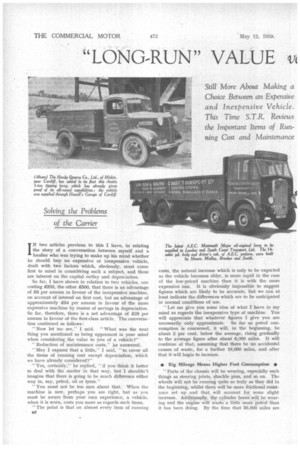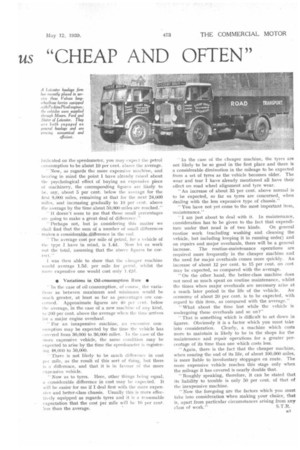"LONG-RUN" VALUE v(
Page 36

Page 37

If you've noticed an error in this article please click here to report it so we can fix it.
us "CHEAP AND OFTEN"
Still More About Making a Choice Between an Expensive and Inexpensive Vehicle. This Time S.T.R. Reviews the Important Items of Running Cost and Maintenance
/N two articles previous to this I have, in relating the story of a conversation between myself and a haulier who was trying to make up his mind whether he should buy an expensive or inexpensive vehicle, dealt with two factors which, obviously, must come first to mind in considering such a subject, and these are interest on the capital outlay and depreciation.
So far, I have shown in relation to two vehicles, one costing £.350, the other £500, that there is an advantage of a per annum in favour of the inexpensive machine, on account of interest on first cost, but an advantage of approximately £34 per annum in favour of the more expensive machine by reason of savings in depreciation. So far, therefore, there is a net advantage of 428 per annum in favour of the first-class article. The conversation continued as follows:
"Now let me see," I said. "What was the next thing you mentioned as being uppermost in your mind when considering the value to you of a vehicle?"
" Reduction of maintenance costs," he answered.
" May I expand that a little," I said, "to cover all the items of running cost except depreciation, which we have already considered?"
"Yes, certainly," he replied, " if you think it better to deal with the matter in that way, but I shouldn't imagine that there is going to be much difference either way in, say, petrol, oil or tyres."
"You must not he too sure about that. When the machine is new, perhaps you are right, but as • you must be aware from your own experience, a vehicle, when it is worn, costs you more as regards such items.
"The point is that on almost every item of running lei costs, the natural increase which is only to be expected as the vehicle becomes older, is more rapid in the case of the low-priced machine than it is with the more expensive one. It is obviously impossible to suggest figures which are likely to be accurate, but we can at least indicate the differences which are to be anticipated in normal conditions of use.
"Let me give you some idea of what I have in my mind as regards the inexpensive type of machine. You will appreciate that whatever figures I give you are necessarily only approximate. So far as petrol consumption is concerned, it will, in the beginning, be about 5 per cent, below the average, rising gradually to the average figure after about 6,000 miles. It will continue at that, assuming that there be no accidental causes of waste, for a further 18,000 miles, and after that it will begin to increase.
• Big Mileage Means Higher Fuel Consumption •
"Parts of the chassis will be wearing, especially such things as steering joints, shackle pins, and so on. The wheels will not be running quite so truly as they did in the beginning, whilst there will be more frictional resistance set up and that will account for some slight increase. Additipnally, the cylinder bores will be wearing and the engine will waste a little more petrol than it has been doing. By the time that 36,000 miles are
indicated on the speedometer, you may expect the petrol consumption to be about 10 per cent. above the average. Now, as regards the more expensive machine, and bearing in mind the point I have already raised about the psychological effect of buying an expensive piece of machinery, the corresponding figures are likely to be, say, about 5 per cent. below the average for the first SAO miles, remaining at that for the next 24,000 miles, and increasing gradually to 10 per cent, above the average by the time about 50,000 miles are reached." " It doesn't seem to me that those sinall percentages are going to make a great deal of difference."
" Perhaps not, but in considering this matter we shall find that the sum of a number of small differences makes a considerable difference in the end.
" The average cost per mile of petrol, for a vehicle of the type I have in Mind, is 1.4d. Now let us work out the total, assuming that the above figures be correct."
I was then able to show that the cheaper machine would average 1.5d. per mile for petrol, whilst the more expensive one would cost only 1,12d.
• Variations in Oil-consumption Rate •
" In the case of oil consumption, of course, the variaiiiffiti as between maximum and minimum would be much greater, at least so far as percentages are concented. Approximate figures are 90 per cent, below he average, in the case of a new machine of any kind, to .200 per cent. above the average when the time arrives for a major engine overhaul.
" For an inexpensive machine, an excessive consumption may be expected by the time the vehicle has covered from 30,000 to 38,000 miles. In the case of the more expensive vehicle, the same condition may be expected to arise by the time the speedometer is registering 48,000 to 50,000.
" There is not likely to be much difference in cost per mile, as the result of this sort of thing, but there is a difference, and that it is in favour of the more expensive vehicle.
" Now as to tyres. Here, other things tieing equal, a considerable difference in cost may be expected. It will be easier for me if I deal first with the more expensive and better-class chassis. Usually this is more effectively equipped as regards tyres and it is a reasonable expectation that the cost per mile will be 10 per cent. less than the average.
" in the case of the cheaper machine, the tyres are not likely to be so good in the first place and there is a considerable diminution in the mileage to be expected from a set of tyres as the vehicle becomes older. The wear and tear I have already mentioned all have their effect on road wheel alignment and tyre wear.
"An increase of about 35 per cent, above normal is to be expected, so far as tyres are concerned, when dealing with the less expensive type of chassis."
"You have not yet come to the most important item, maintenance."
"I am just about to deal with it. In maintenance, consideration has to be given to the fact that expendi ture under that nead is of two kinds. On general routine work (excluding washing and cleaning the vehicle, but including keeping it in running order) and on repairs and major overhauls, there will be a general increase. The routine-maintenance operations are required more frequently in the cheaper machine and the need for major overhauls comes more quickly. An increase of about 12 per cent. to 15 per cent. on cost may be expected, as compared with the average.
" On the other, hand, the better-class machine does not need so much spent on routine maintenance, whilst the times when major overhauls are necessary arise at a much later period in the life of the vehicle. An economy of about 20 per cent. is to be expected, with regard to this item, as compared with the average."
"What about the time lost while the vehicle is undergoing these overhauls and so on?"
"That is something which is difficult to set down in figures. Obviously it is a factor which you must take into consideration. Clearly, a machine which costs more to maintain is likely to be in the shops for the maintenance and repair operations for a greater percentage of its time than one which costs less.
"Again, there is the fact that the cheaper machine, when nearing the end of its life, of about 100,000 miles, is more liable to involuntary stoppages en route. The more expensive vehicle reaches this stage only when the mileage it has covered is nearly double that.
"Roughly speaking, therefore, it can be stated that its liability to trouble is only 50 per cent. of that of the inexpensive machine.
"Now the foregoing are the factors which you must take into consideration when making your choice, that is, apart from particular circumstances arising from any
class of work." S.T.R.














































































